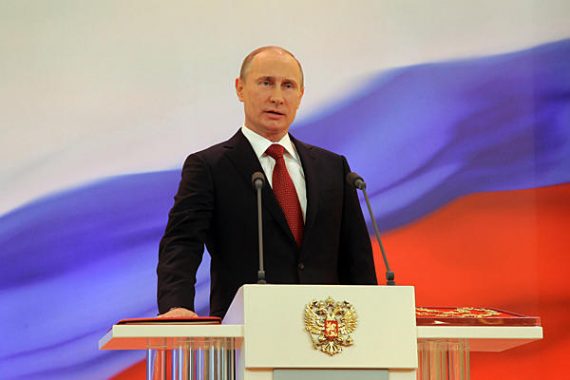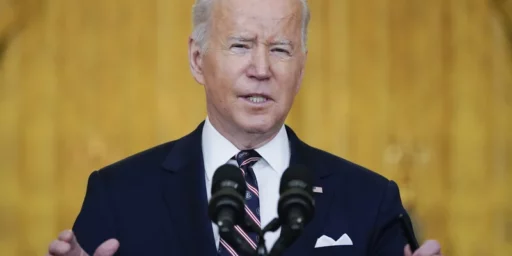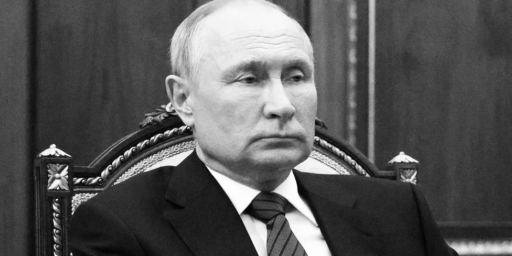New Russian Law Requires Bloggers To Register With The Kremlin
Vladimir Putin wants to put the Internet genie back in the bottle.
The crackdown on freedom of speech in Russia under Vladimir Putin continues:
MOSCOW — Russia has taken another major step toward restricting its once freewheeling Internet, as President Vladimir V. Putin quietly signed a new law requiring popular online voices to register with the government, a measure that lawyers, Internet pioneers and political activists said Tuesday would give the government a much wider ability to track who said what online.
Mr. Putin’s action on Monday, just weeks after he disparaged the Internet as “a special C.I.A. project,” borrowed a page from the restrictive Internet playbooks of many governments around the world that have been steadily smothering online freedoms they once tolerated.
Widely known as the “bloggers law,” the new Russian measure specifies that any site with more than 3,000 visitors daily will be considered a media outlet akin to a newspaper and be responsible for the accuracy of the information published.
Besides registering, bloggers can no longer remain anonymous online, and organizations that provide platforms for their work such as search engines, social networks and other forums must maintain computer records on Russian soil of everything posted over the previous six months.
“This law will cut the number of critical voices and opposition voices on the Internet,” said Galina Arapova, director of the Mass Media Defense Center and an expert on Russian media law. “The whole package seems quite restrictive and might affect harshly those who disseminate critical information about the state, about authorities, about public figures.”
(…)
Speaking in St. Petersburg in late April, Mr. Putin voiced his suspicions about the Internet, even while noting that it had become a public market of huge proportions.
“You know that it all began initially, when the Internet first appeared, as a special C.I.A. project,” he said in remarks broadcast live nationally, before adding that “special services are still at the center of things.” He specifically thanked Edward J. Snowden, the former National Security Agency contractor granted asylum in Russia, for revealing to the world how efficient the N.S.A. was at collecting information.
Mr. Putin went on to say that someone writing online whose opinion affects thousands or even hundreds of thousands of people should be considered a media outlet. He said he was not talking about a ban, only acting “the way it is done all over the world.”
Rus sian Internet pioneers despaired that Mr. Putin was really talking about the Chinese model of curtailing any political discussion online.
“It is part of the general campaign to shut down the Internet in Russia,” said Anton Nossik, an early online media figure here. “They have not been able to control it until now, and they think they should implement the Chinese model. But they don’t understand how it works. The Chinese model also stimulates the development of local platforms, while the Russian laws are killing the local platform.”
This, of course, is just one example of the effort that Russia under Vladimir Putin has sought to stifle dissent and punish those who speak out against the state. The most famous international example, of course, was the arrest and imprisonment of punk rock group Pussy Riot after a protest staged in an Orthodox Cathedral in Moscow. Before the Sochi Olympics, Russian authorities took extraordinary efforts to prevent those who might protest against the government for one reason or another from getting anywhere near the site of the Olympics in an obvious effort to prevent such protests from being broadcast from the rest of the world. Putin has also used state authority to clamp down on political rivals and critics using charges of corruption that seem to be quite trumped up and rather convenient. Indeed, in some sense, this isn’t really anything new either. Post-Soviet Russia was hardly a bastion of freedom of speech even before Putin came to power, although there was arguably more freedom granted to opposition groups granted in the past than their is today. Slowly but surely, Putin and his cronies have worked to restore the control over expression that existed under the Soviet Union. They may not be able to reimpose all of those controls, but they’re getting pretty darn close and, more importantly, laws such as this will go a long way toward chilling speech, expression, and the exchange of ideas outside of officially approved channels. That, of course, is exactly what an authoritarian leader who maintains a facade of democracy wants.
Notwithstanding all these new controls and the obvious desire of Putin and his cronies to control as much communication in Russia as they can, I have to wonder how much they’ll be able to succeed. Controlling the spread of information is much more difficult in the era of the Internet, computers a, and smartphones, than it was in an era where the only real way to spread information was via printed literature. Back then, printing presses, mimeographs, and copy machines were tightly controlled by the Soviet state and, even then, dissidents were able to spread their ideas via samizdat, a phrase that essentially means “self-published” in Russian. That dissident movement stayed alive throughout the numerous crackdowns under Lenin, Stalin, Malenkov, Khrushchev, Brezhnev, Andropov, and Chernenko thanks in no small part to their ability to evade the Soviet laws meant to silence them. Technology makes it much easier to evade centralized monitoring and control than it was in the days of mimeographs and printing presses, of course, and we’ve seen that manifested in response to crackdowns on Internet use in Turkey, Egypt, Iran, and elsewhere in the world.
This reminds me of a book I read twenty years ago when the Internet Era was in its infancy. That book was Orwell’s Revenge by Peter Huber. The premise of Huber’s book was that George Orwell’s fear in 1984
that technology would make it easier for totalitarian societies to enslave citizens. A premise emphasized by the always-on and always-watching telescreen. Huber argued that the opposite was true, that technology actually empowered individuals and made it possible for them to turn the weapons of Big Brother against the powers-that-be. So far, we’ve seen many examples of how the technology that was just in its infancy when Huber wrote his book has allowed people in authoritarian regimes to make the controls imposed on their ability to communicate and get news about the outside world largely irrelevant. It’s likely that Putin and his cronies will find that something very similar happens in Russia.







Outside Cliven Bundy…the Republicans biggest hero.
It’s a good thing Edward Snowden chose asylum in a country with a better record on mass surveillance than risking imprisonment here. The following year of Russia’s behavior has in no way implicitly undermined the good faith of his convictions.
If only we had a strong leader like him here at home. He also wrestles bears and drills for oil.
Where do media outlets need to register with the government?
@Tillman:
I got an encrypted e-mail from Brazil that tells me Snowden is definitely going to ask about this on the next episode of “Ask Putin Anything.”
@Tillman:
What do you mean “risk” imprisonment? “Risk” implies a probability less than 1.0. It’s a certainty that he would be imprisoned, for a large portion of his remaining life. Especially since he would be legally barred from from making any argument about the reasons for his leak or any sort of public good or interest. He, quite literally, would not be allowed to present an argument in his defense.
@Ben:
Bull. If he stands before a court in the US, of course he’ll be able to present his defense. That’s his constitutional right.
What you’re talking about is not a legal defense, it’s a justification. “I did for the public good’ is no more a defense of an espionage charge than “he killed my father” is a valid defense for a murder charge.
If Snowden wants to defend himself from his actions, he should deny the accusations entirely or deny that they rise to the technical level of “espioniage.” If he wants to go into court, saying “Yeah, I stole all your stuff….but I did it for the People!” he might as well just plead guilty and spare us all the expense of a trial.
@Ben: Yeah. It’s not as if all that information he leaked would speak for itself. It’s not like the same, exact debate of “Hero vs. Traitor” would have gone on in the media anyway.
You ascribing a lot of value to Snowden’s particular voice.
All I was saying is that your use of the term “risk imprisonment” is misleading, because it’s not a risk, it’s a certainty. Let’s not kid ourselves.
And if had the choice between living in Russia or in an American prison, I’d choose the former too.
@Ben: Point taken.
@Ben:
Little did you know, Ben, but this choice was submitted to you this morning. You went with Option C:
NOT stealing classified material.
@Franklin:
Interesting question. The Center for Internet Media states 25% of the 100 or so nations examined required licensure but their report seems to leave out which countries.
A better idea is Freedom House’s Freedom of Press 2014 world map which tells us 1 in 7 countries have a free press. So take it from there.
Since Putin controls the links in and out of Russia and no problems cracking heads, might see a return to samzidat.
If only we had a strong leader like Putin!
@mantis: Great idea. I’m thinking Michael Reynolds for benevolent dictator for life.